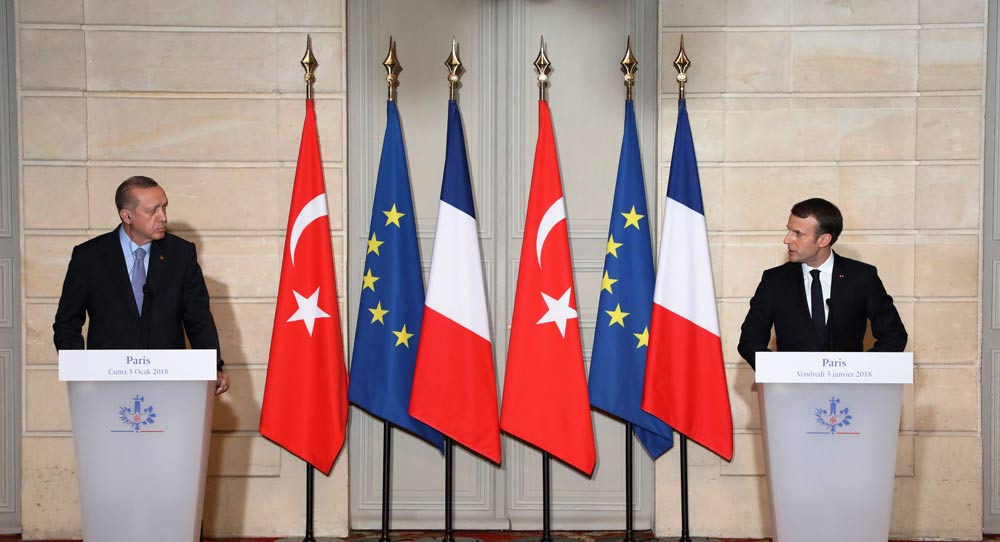Turkish President Recep Tayyip Erdoğan’s talks with French President Emmanuel Macron in Paris on January 5 were intended to mark Turkey’s return to the European stage after eighteen months of acrimonious exchanges. Beyond the protocol choreography, the exact opposite happened: France clearly stated “non” to the prospect of Turkey’s EU accession, joining the positions of the Netherlands and Austria, and followed by a similar announcement from Germany’s pre-coalition partners just a few days later.
Over the past few weeks, Turkey’s position in Europe has undergone a significant sea change, leading to a fresh search for other policy frameworks. However, Ankara’s current focus on military operations in northwest Syria is now likely to relegate EU relations to the back burner.
In Paris, as part of Macron’s straight-talking approach with countries with whom France substantially disagrees, there was a genuine interest in hosting Turkey’s president. Agenda items included fostering trade and defense interests; securing cooperation on counterterrorism and migration; publicly criticizing the rule of law situation in Turkey; rebalancing Ankara’s relationship with Moscow; and avoiding further diplomatic isolation. This real interest came with a price tag: “no” to EU accession.
For Turkey, meanwhile, the visit was part of an “old friends” strategy that suddenly emerged after several months of trading barbs with European leaders. The charm offensive was aimed at France, Germany, and Bulgaria (which currently holds the EU Council presidency). Convergence on general subjects such as fighting terrorism (though defined differently by both parties) and on Jerusalem’s status was underlined. A warm welcome at the Élysée Palace—and the Turkish foreign minister’s cup of tea at his German counterpart’s home the next day—hit the headlines in Turkey’s pro-government media. Optically, Turkey made an apparent comeback from its diplomatic isolation.
But none of this is as easy as it looks given the wholesale dismantling of the rule of law in Turkey since July 2016. Ankara’s strategy—aimed at political survival at home—is to purge the state of Gülen sympathizers and to cleanse the political and civilian landscape of any form of dissent and diversity, mostly through spurious charges. Under an ever-prolonged emergency rule, a massive clampdown on academia, media, civil society, security forces, and business circles has resulted in 152,000 people being dismissed from public jobs and 132,000 people detained, of whom 64,000 have been formally arrested, according to Turkey Purge.
In parallel, a one-man-rule system is being implemented day by day, while an ultra-presidential system was agreed through a highly-contested referendum last April. Recently, more stringent decrees were signed and the independence of the constitutional court was challenged by the government.
As a result, Turkey is now at odds with the principles it had adopted in December 2004 to win its EU candidate country status: the separation of powers, free and fair elections, a free media, an independent judiciary, and a vibrant civil society.
In Europe, the political mood about Turkey has changed massively since late October: the Dutch coalition government will propose alternatives to accession; the Austrian coalition in power will oppose any move toward Turkey joining the EU; Germany’s current pre-coalition agreement excludes progress on accession, visas, and the Customs Union. Despite cozying up with Turkey’s president on January 5, Macron ultimately chose to firmly close the accession road. This now makes for a very different landscape.
Do EU leaders no longer view the Turkish president as a trusted political ally? To a large extent, they do not. Turkey’s authoritarianism is seen as one-way voyage, simply because Erdoğan will not jeopardize his grip on power by returning to the rule of law anytime soon. As long as Turkey’s political leadership undermines the rule of law, brings its domestic political fights to Europe, and routinely uses anti-EU narratives, there can be no political alliance—despite Turkey’s NATO membership. Therefore the question of rekindling accession negotiations doesn’t even arise anymore, despite Ankara’s improbable proclamations that it upholds the rule of law.
Does this means an isolation strategy? No, it is rather a policy adjusted to Ankara’s own political choices. The EU will keep talking to Turkey. Substance and format still have to be decided on the basis of forthcoming European Commission proposals.
On substance, several subjects of mutual interest are on the table: a modernized Customs Union (politically the most difficult item), cooperation on refugees, cooperation on counterterrorism, bilateral investment and joint defense industry projects, and ministerial meetings in technical areas.
Along with this substantive technical agenda, discussing human rights in Turkey and acting on them will be a political must.
Throughout this process, hopefully, the citizens of Turkey will understand that Europeans hold no grudge against their country or against them as a people. This is not a fight of Europe against Turkey. It is about European citizens defending their own democracy and supporting Turkey’s democrats. Ultimately, it is about the people of Turkey choosing the political system they prefer.
On format, some EU countries—Bulgaria first among them—will want to satisfy President Erdoğan’s longing for summits. Such meetings in December 2004 and October 2015, and even the January 5 press conference in Paris, have left sour memories for those politicians present. Extreme caution is therefore in order. A summit would not help to restore the rule of law in Turkey, but would condone massive human rights infringements and bitterly displease EU citizens.
None of the above would likely impress Turkey’s president much, either. What matters to him is his reelection. Apart from military motivations, the current Turkish operation in Syria—dubbed “Olive Branch”—has an overwhelming goal: to ramp up nationalist sentiments and project the Turkish president as the only politician who can steer the country through a dangerous situation. In these circumstances, agreeing with the EU won’t matter much.







.jpg)